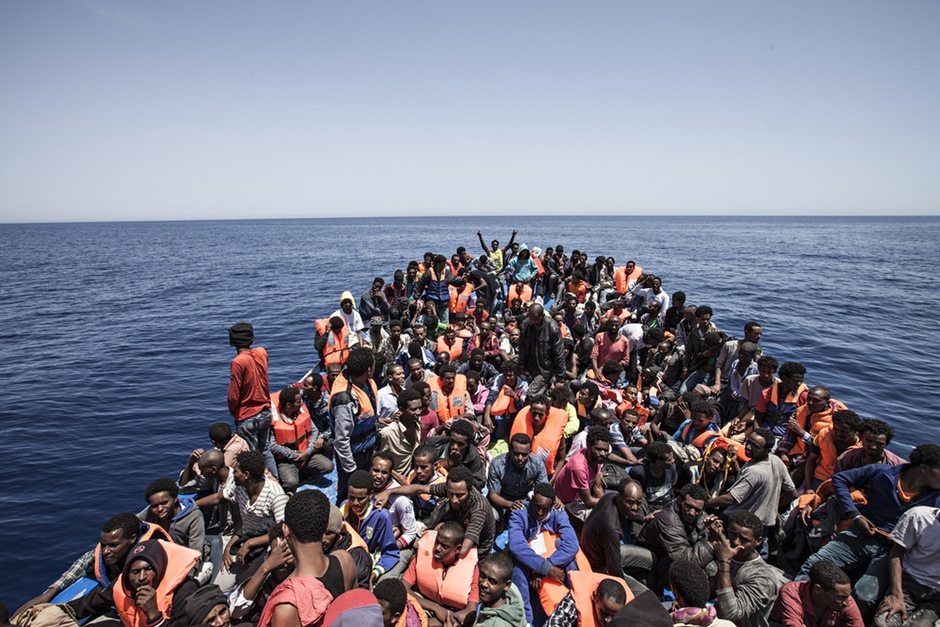
Over the past weekend, IOM staff in Niger and Libya documented shocking events on North African migrant routes, which they have described as 'slave markets' tormenting hundreds of young African men bound for Libya.
Operations Officers with IOM’s office in Niger, reported on the rescue of a Senegalese migrant (referred to as SC to protect his identity) who this week was returning to his home after being held captive for months.
According to SC’s testimony, while trying to travel north through the Sahara, he arrived in Agadez, Niger, where he was told he would have to pay 200,000 CFA (about USD 320) to continue north, towards Libya. A trafficker provided him with accommodation until the day of his departure, which was to be by pick-up truck.

The journey – over two days of travelling – through the desert was relatively smooth for this group. IOM has often heard from other migrants on this route who report seeing the remains of others abandoned by their drivers – and of trucks ransacked by bandits who siphon away their fuel.
SC’s fate was different. When his pick-up reached Sabha in southwestern Libya, the driver insisted that he hadn’t been paid by the trafficker, and that he was transporting the migrants to a parking area where SC witnessed a slave market taking place. “Sub-Saharan migrants were being sold and bought by Libyans, with the support of Ghanaians and Nigerians who work for them,” IOM Niger staff reported this week.
SC described being 'bought' and then being brought to his first 'prison', a private home where more than 100 migrants were held as hostages.

He said the kidnappers made the migrants call their families back home, and often suffered beatings while on the phone so that their family members could hear them being tortured. In order to be released from this first house, SC was asked to pay 300,000 CFA (about USD 480), which he couldn’t raise. He was then 'bought' by another Libyan, who brought him to a bigger house – where a new price was set for his release: 600,000 CFA (about USD 970), to be paid via Western Union or Money Gram to someone called 'Alhadji Balde', said to be in Ghana.
SC managed to get some money from his family via mobile phone and then agreed to work as an interpreter for the kidnappers, to avoid further beatings. He described dreadful sanitary conditions, and food offered only once per day. Some migrants who couldn’t pay were reportedly killed, or left to starve to death.
SC told IOM that when somebody died or was released, kidnappers returned to the market to 'buy' more migrants to replace them. Women, too, were 'bought' by private individuals – Libyans, according to this witness – and brought to homes where they were forced to be sex slaves.

IOM collects information from migrants returning from Libya and passing through IOM transit centres in Niamey and Agadez. “Over the past few days, I have discussed these stories with several who told me horrible stories.
They all confirmed the risks of been sold as slaves in squares or garages in Sabha, either by their drivers or by locals who recruit the migrants for daily jobs in town, often in construction, and later, instead of paying them, sell their victims to new buyers.
Some migrants – mostly Nigerians, Ghanaians and Gambians – are forced to work for the kidnappers/slave traders as guards in the ransom houses or in the ‘market’ itself,” said an IOM Niger staffer.
A Senegalese migrant, who was not named to protect his identity, said that he had been sold at one such market in the southern Libyan city of Sabha.
He was later taken to a makeshift prison where more than 100 migrants were being held hostage.

He said that migrants held at the facility were told to call their families, who would be asked for money to pay for their release.
According to the migrant, some of them were beaten while on the phone to allow relatives to hear them being tortured.
The report adds how the Senegalese migrant described “dreadful” conditions where migrants were forced to survive on limited food supplies.
Those unable to pay the ransome demanded either killed or left to starve, the report adds.
Another witness also revealed that women, too, were bought by private Libyan clients and brought to homes where they were forced to be sex slaves.
The IOM’s chief of mission for Libya, Othman Belbeisi, told the BBC that those sold into slavery found themselves priced according to their abilities.
He said:
“Apparently they don’t have money and their families cannot pay the ransom, so they are being sold to get at least a minimum benefit from that.
“The price is definitely different depending on your qualifications, for example if you can do painting or tiles or some specialized work then the price gets higher.”
An IOM staff member in Niger said they confirmed the reports of auctions in Libya with several other migrants who had escaped.
The IOM staff revealed:
“They all confirmed the risks of been sold as slaves in squares or garages in Sabha, either by their drivers or by locals who recruit the migrants for daily jobs in town, often in construction.
“Later, instead of paying them, [they] sell their victims to new buyers.”
An IOM employee also dsclosed that some migrants, mainly Nigerians, Ghanaians and Gambians are forced to work “as guards in the ransom houses or in the ‘market’ itself.”
The organization has called the emergence of these markets “a disturbing new trend in the already dire situation for migrants in Libya”.
Via - iom.int/news/
No comments:
Post a Comment